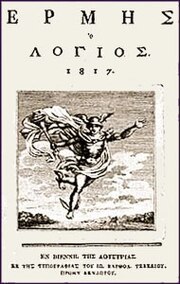 Issue of 1817 | |
| Editor | Anthimos Gazis, Theoklitos Farmakidis, Konstantinos Kokkinakis |
|---|---|
| Categories | Science, History, Arts |
| First issue | 1811 |
| Final issue | 1821 |
| Language | Greek |
Hermes o Logios, also known as Logios Ermis (Greek: Ἑρμῆς ὁ Λόγιος, "Hermes the Scholar") was a Greek periodical printed in Vienna, Austria, from 1811 to 1821. It is regarded as the most significant and longest running periodical of the period prior to the outbreak of the Greek War of Independence,[1] containing contributions by key scholars and intellectuals.[2][3][4] Hermes o Logios aimed at creating intellectual contacts between the Greek communities of the Ottoman Empire and the Diaspora in Western Europe, as well as the preparing national awakening of the Greek people.[5]
The periodical started its circulation after a proposal by Adamantios Korais, a leading figure of the modern Greek Enlightenment, who had stressed the need of a printed medium, written in vernacular Greek. This initiative was supported by the Philological Society in Bucharest, an organization consisting of Greek intellectuals. Hermes o Logios reflected the style of other European periodicals of early 19th century and reviewed developments in arts and sciences, being an important channel for bringing contemporary intellectual movements to the attention of the Greeks that lived in the Ottoman Empire.[1] It was closed down by the Austrian authorities when the Greek War of Independence broke out.[6][7]
- ^ a b Greece: Books and Writers (PDF). National Book Centre of Greece - Ministry of Culture. 2003. p. 63. ISBN 960-7894-29-4.
- ^ Cite error: The named reference
Janssen5was invoked but never defined (see the help page). - ^ "History Research Institutes in Southeast Europe A Handbook" (PDF). Center for the Study of Balkan Societies and Cultures. Department for Southeast European History, University of Graz, 2004. p. 51. Retrieved 2010-05-10.
- ^ Pappas, Karas: p.4
- ^ García, Margarita Díaz-Andreu (2007). A world history of nineteenth-century archaeology: nationalism, colonialism, and the past. Oxford University Press. p. 84. ISBN 978-0-19-921717-5.
- ^ Institut français d'études anatoliennes d'Istanbul (2003). Médecins et ingénieurs ottomans à l'âge des nationalismes. Maisonneuve & Larose. pp. 226, 231. ISBN 978-2706817625.
- ^ Cite error: The named reference
Mackridge142was invoked but never defined (see the help page).